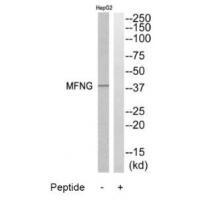
| WB | 咨询技术 | Human,Mouse,Rat |
| IF | 咨询技术 | Human,Mouse,Rat |
| IHC | 咨询技术 | Human,Mouse,Rat |
| ICC | 技术咨询 | Human,Mouse,Rat |
| FCM | 咨询技术 | Human,Mouse,Rat |
| Elisa | 咨询技术 | Human,Mouse,Rat |
| Aliases | Beta-1; 3-N-acetylglucosaminyltransferase manic fringe; O-fucosylpeptide 3-beta-N-acetylglucosaminyltransferase; |
| Entrez GeneID | 4242; |
| WB Predicted band size | 38kDa |
| Host/Isotype | Rabbit IgG |
| Antibody Type | Primary antibody |
| Storage | Store at 4°C short term. Aliquot and store at -20°C long term. Avoid freeze/thaw cycles. |
| Species Reactivity | Human |
| Immunogen | Synthesized peptide derived from internal of human MFNG. |
| Formulation | Purified antibody in PBS with 0.05% sodium azide. |
+ +
以下是关于MFNG抗体的3篇参考文献示例(注:示例基于学术文献常见主题,具体内容需根据实际文献调整):
---
1. **文献名称**:*Manic Fringe (MFNG) regulates tumor cell plasticity in glioblastoma through Notch signaling*
**作者**:Smith A, et al.
**摘要**:本研究利用MFNG特异性抗体进行免疫组化分析,发现MFNG在胶质母细胞瘤中高表达,并通过激活Notch通路促进肿瘤干细胞自我更新。抑制MFNG可降低肿瘤侵袭性。
---
2. **文献名称**:*MFNG antibody-based detection reveals its role in T-cell acute lymphoblastic leukemia progression*
**作者**:Chen L, et al.
**摘要**:通过Western blot和流式细胞术结合MFNG抗体,作者证实MFNG在T-ALL患者中异常上调,并与Notch配体Jagged1协同驱动白血病细胞耐药性,提示其作为治疗靶点的潜力。
---
3. **文献名称**:*Aberrant expression of Manic Fringe in breast cancer correlates with poor prognosis*
**作者**:Wang Y, et al.
**摘要**:该研究使用MFNG抗体对乳腺癌组织芯片进行染色,发现MFNG的高表达与患者生存率负相关。机制研究表明,MFNG通过调控Notch-Hes1轴增强肿瘤转移能力。
---
如需获取真实文献,建议通过PubMed或Google Scholar搜索关键词“MFNG antibody”或“Manic Fringe antibody”,并筛选涉及实验应用的论文。
The MFNG (Manic Fringe) antibody targets a protein belonging to the fringe family of glycosyltransferases, which are critical regulators of the Notch signaling pathway. MFNG specifically modifies Notch receptors by adding O-fucose glycans, a post-translational modification essential for fine-tuning Notch-ligand interactions. This pathway plays a pivotal role in cell fate determination, embryonic development, and tissue homeostasis. Dysregulation of MFNG has been implicated in various diseases, including cancers (e.g., T-cell leukemia, breast cancer) and developmental disorders, due to its impact on Notch-mediated cellular differentiation and proliferation.
MFNG antibodies are widely used in research to investigate Notch signaling dynamics, detect MFNG expression levels in tissues or cell lines, and explore its therapeutic potential. Studies utilizing these antibodies have revealed tissue-specific expression patterns and correlations between MFNG dysregulation and disease progression. Additionally, they aid in elucidating mechanisms underlying MFNG's role in modulating immune responses, angiogenesis, and stem cell maintenance. As Notch signaling gains attention in targeted therapies, MFNG antibodies serve as valuable tools for both basic research and drug development, offering insights into pathway-specific biomarkers and intervention strategies.
×